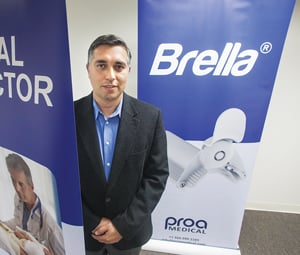In her family practice, Dr. Carrie Nichols would come up with ideas on how to improve medical devices. But she didn’t know how to go about patenting those ideas or bring them to market, so she set them aside.
But not anymore. Now, Nichols has a place to turn to when she comes up with one of her ideas: Proa Medical Inc., an incubator and accelerator in Redondo Beach that focuses on incremental improvements to existing medical technologies.
Proa has pooled the resources of five physicians – including Nichols – and has raised more than $1 million from additional outside investors to get these ideas patented, develop the product improvements and get regulatory approvals.
“Most physicians have no idea how to go about getting a patent or bringing a product to market,” Nichols said. “Proa’s big advantage is that we have all the areas of expertise needed to bring product to market in our group.”
Last month, Proa received the green light from the Food and Drug Administration to sell a new version of its device for gynecological examinations that improves on existing tools by adding a light.
Proa Chief Executive Arman Nadershahi, a patent attorney and engineer, said the incubator has nine other medical products in various stages of development.
Proa differs from most other medical device incubators because the products in its portfolio are incremental improvements to existing technologies, not major technological breakthroughs on their own.
Proa was the brainchild of the late Ric Hahn, a family doctor like Nichols, who worked at the USC family medical residency program. Hahn was working with the Alfred Mann Institute at the university to bring medical devices to market. But when he tried to get the institute interested in the added light on the gynecological exam tool, he realized that it was primarily focused on breakthrough technologies with blockbuster potential. No one was looking at how to bring more incremental product improvements to market; in other words, tweaking an existing technology to target a new niche market or just making life a little easier for doctors or surgeons.
So, four years ago, Hahn gathered several physicians to form Proa, brought in Nadershahi and formed Proa. The first product in its pipeline: the lighted exam tool, is called the Brella speculum. (Hahn died last year; Nichols has since taken over commericalization of the speculum.)
“We are giving these underdogs a fighting chance to get their products to market,” Nadershahi said. “Otherwise, the product concepts would likely just remain sitting on the shelf.”
Easier FDA process
Incubators such as Proa fill a gap in the development of medical devices, especially those offering incremental improvements.
“There are a lot of really good ideas that don’t have a commercial path for lack of a few million dollars and professional management,” said Don White, founder of Md2G, a medical device incubator in Gainesville, Ga., comparable to Proa. “Incubation is a way to address that.”
Because Proa’s products are improved existing medical devices, they only need to be compared to those existing devices; under federal regulation 510(k), they do not need to go through extensive and time-consuming clinical trials.
“You generally don’t need as rigorous testing and data collection for products on the 510(k) track,” said Ahmed Enany, chief executive of the Southern California Biomedical Council, an industry group.
Nadershahi said once Proa develops the devices and gets clearance from the FDA to sell them, they should become much more appealing to major medical products companies. In fact, several major women’s health product companies have already expressed interest in the Brella speculum.
“We take a lot of the risk out, which then increases the value of the devices,” he said.
Enany said he knows of other incubators that use a business model similar to Proa’s. One of those was Sandell Medical Solutions of Chatsworth, which has produced a number of products for workplace safety, reducing surgical errors and medication labeling, among other uses.
Sandell was acquired in 2011 by the North American subsidiary of Australian medical giant Ansell, in Richmond, New South Wales.
Nadershahi said a similar acquisition of Proa is possible. He’s in talks with several medical device companies that could result in licensing agreements, strategic relationships or even an acquisition of Proa.
Until then, developing products does carry some risk. Once a Proa product is out in the marketplace, it might not meet sales expectations because physicians might not be willing to buy a slightly more versatile version of something they already have.
So with little potential for a blockbuster product, Enany said it’s essential for an incubator such as Proa to have a portfolio of products on the path to market.
“You’re generally dealing here with small markets,” he said. “And while there’s not a lot of risk in developing these products, there’s not a whole lot of upside either.”

